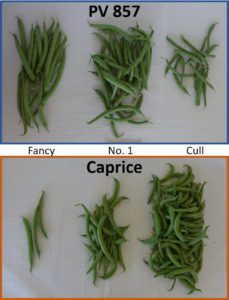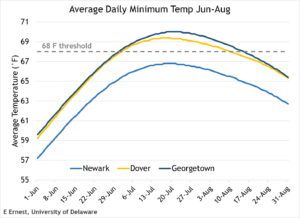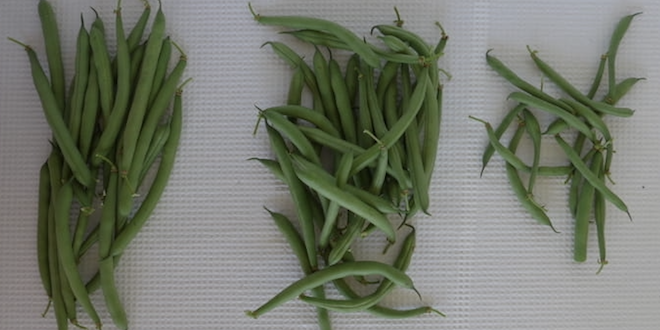Mar 7, 2022Selecting heat-tolerant snap bean varieties
Snap beans are sensitive to high night temperatures during flowering. Sixty-eight degrees Fahrenheit (68 °F) is considered the threshold temperature for damage to anthers and pollen, which leads to poor pod set, misshapen pods and reduced marketable yield (Figure 1).


Plantings of snap beans made in June and early July are likely to be exposed to high night temperatures during flowering. Figure 2 shows the daily average minimum temperatures for three locations in Delaware for June, July, and August. These averages are based on 30 years of data (1991-2020). Average daily minimum temperatures are above 68 °F from July 1 to August 15 in Georgetown and from July 2 to August 10 in Dover. The heat-susceptible early flowering period begins about 30 days after planting, so snap beans planted from June 1 to July 16 in southern Delaware are at high risk of heat stress exposure.


From 2017 to 2021 I conducted snap bean variety trials at the Carvel Research and Education Center in Georgetown, Delaware. The purpose of these trials was to identify snap bean varieties that maintain yield and quality when night temperatures are higher than 68 °F. The round-podded varieties that produced the highest marketable yields under heat stress in multiple years of trials are ‘PV 857’ and ‘Bridger’. Two additional varieties of interest are ‘Jaguar’ and ‘Byrd’. Jaguar performed well in the 2021 heat stress trial but has only been trialed in Delaware for one year. Byrd has moderate heat tolerance based on 2020 and 2021 trials and was the highest yielding variety in a 2021 trial where many varieties succumbed to pythium root rot. Among the flat podded varieties tested in 2019 and 2021, ‘Usambara’ performed well under heat stress in both years and produced significantly higher yields than the other trialed varieties. ‘Tapia’ is another flat podded variety that had good yields in both years’ trials.
Full trial reports for the 2017-2020 trials are available on the Vegetable Variety Trials page. The 2021 Snap Bean Trial Report is linked here.
– Emmalea Ernest, University of Delaware















